Since the discussion around the effects of generative models doesn’t seem to be going away, I figured I’d give in and write about my point of view of this stuff. Specifically, I wanted to talk about how I see some of the tradeoffs involved.
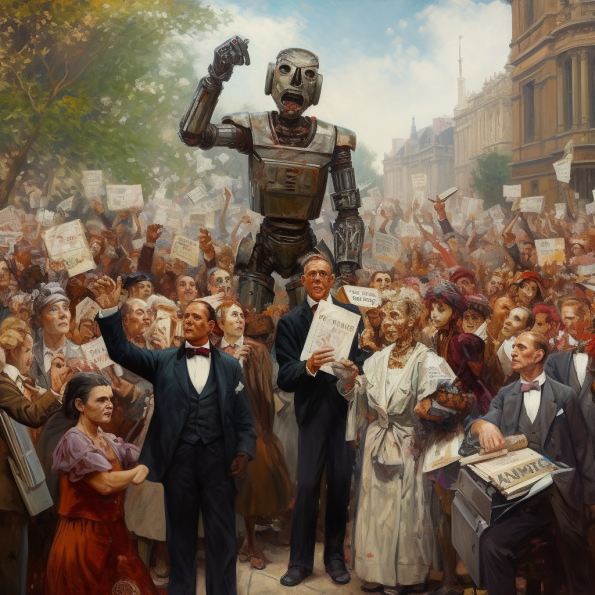
Midjourney responding to the prompt “humans protesting against robots in 19th century britain impressionist style”
The first is the question of how much to worry about people being automated out of work. Which is not great; many artists, writers, and programmers quite reasonably feel threatened by that!
I’m not going to discount that worry, but it’s also not obvious to me that making it easy to produce art / writing / code is going to reduce the demand for artists / writers / coders. If something becomes easier to do, then its cost becomes lower, and so the demand for it increases. And sometimes that increased demand increases the total market enough to increase employment in that market; and not just employment of people doing whatever job in firms in those areas, but of people working specifically on the very jobs where automation is increasing.
Take programming as an example: it’s constantly getting more and more automated. If you go back to the middle of last century, people had to program by flipping switches to enter binary code into a machine. Then assemblers and linkers came along to allow programmers to think in terms of machine instructions and to let the computers turn those instructions into binary. Then higher level programming languages and compilers and interpreters came along to let people address the computer in a way that wasn’t native to the computer (and those languages went through decades of evolution). And, as programming languages were spreading, they were accompanied by the spread of libraries, frameworks, and services, and tooling to make it easier to work with all of this.
So huge amounts of labor have been automated away. But this doesn’t mean that programming jobs have shrunk correspondingly, or anything close to that; instead, the result has been software taking over more and more of the economy, with jobs growing accordingly!
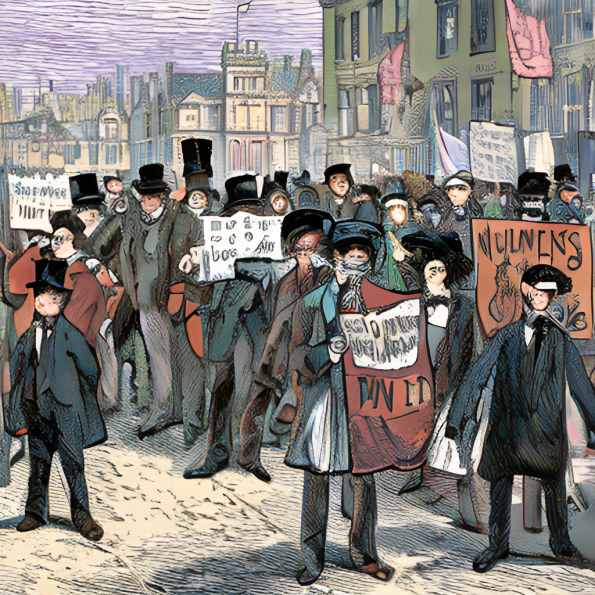
Stable Diffusion responding to the prompt “humans protesting against robots in 19th century britain impressionist style”
I’m not going to say that that trend is necessarily going to continue as generative models help more people program more efficiently; but I guess my default assumption is that it will? And I’m also not sure that the market for other areas where generative models are having an effect will expand in the same way, but I also don’t see a reason to assume that they won’t.
For example, I saw some people make statements along the lines of “you should never use generative models to produce visual art, if you want a drawing in something you’re making, you should pay an artist for it”. But there are lots of people who never use custom art, whether because of financial reasons or time constraints; if some of them start using computer-generated art, then the market is larger. At least it’ll be larger in terms of the amount of new art being created; whether that will increase or decrease the amount of money spent on art, and whether it will increase or decrease the amount of money paid to human artists, isn’t particularly clear. But, again, I don’t see why the answer to either of those is “decrease”: in particular, once somebody gets used to having custom art, they might end up being unhappy with the quality of computer-generated art and being interested in paying a human at least some of the time.
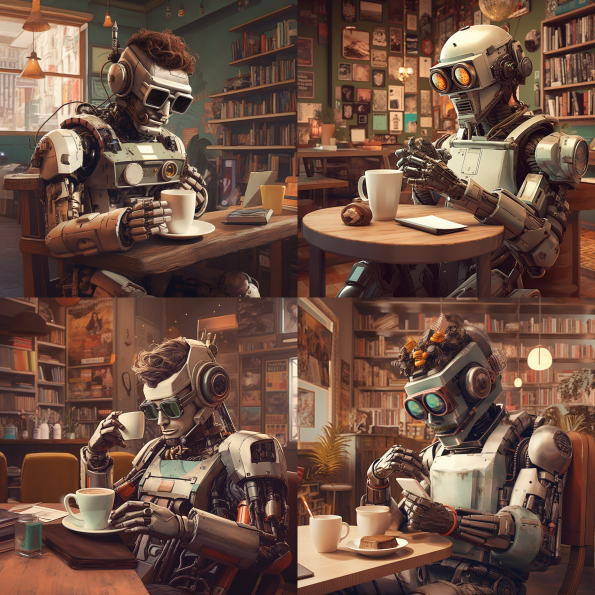
Four Midjourney responses to the prompt “hipster robot drinking coffee in a library cafe while listening to jazz records”
So that’s the most optimistic spin on the effects of generative models on humans who do similar work. But of course, not all automation has that kind of effect; that doesn’t mean that it’s bad, though! We’ve increased the efficiency of food production many fold over the decades, and, as a result; many many fewer people now work on farms than did a century ago. Which is a good thing: it means that there’s a much larger quantity and variety of food available now than there was a century ago. And tons of jobs are still available in the economy, they’re just different jobs; personally I’d rather work as a programmer (a job that didn’t exist a century ago) than as a farm worker.
As examples of how this might play out in game production: when listening to interviews with voice actors, one thing that they regularly bring up is that some of what they do is physically strenuous and even dangerous, with barks being brought up as an example of the latter. So if we could automate the production of barks, that probably would be a good thing? AAA games in general take much longer to produce these days than in previous decades, and one culprit that I’ve repeatedly heard cited is the difficulty of producing art to the resolution standard that modern consoles and graphics cards allow; if generative models can reduce the effort required there (or, for that matter, the programming effort required for modern games), then that’s a good thing, I would think? Or if small teams were able to start shrinking the visual / audio gap between their games and AAA games, that sounds like a plus as well. And that sounds like a plus to me even if it means that there are smaller armies of artists or programmers employed in the game industry; ultimately, to me, the game industry matters to me because of the games rather than as a jobs project.
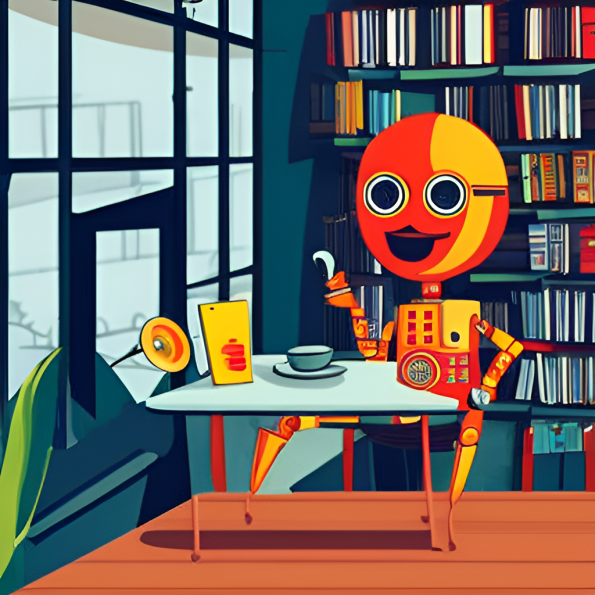
Stable Diffusion responding to the prompt “hipster robot drinking coffee in a library cafe while listening to jazz records”
I don’t want to completely discount the issue of people being put out of work by automation. But also there’s nothing sacred about the exact division of money going to people in different jobs, new jobs appear all the time and job categories shrink all the time, and that’s okay? (I would actually say that it’s an actively good thing, an economy where job categories stay the same size is a stagnant one.) And, right now, the employment levels in the United States are amazing high and have been that way for a while, even in the face of inflation and interest rate hikes that would normally push us in the other direction; it seems like an odd time to be too doomerist about employment levels.
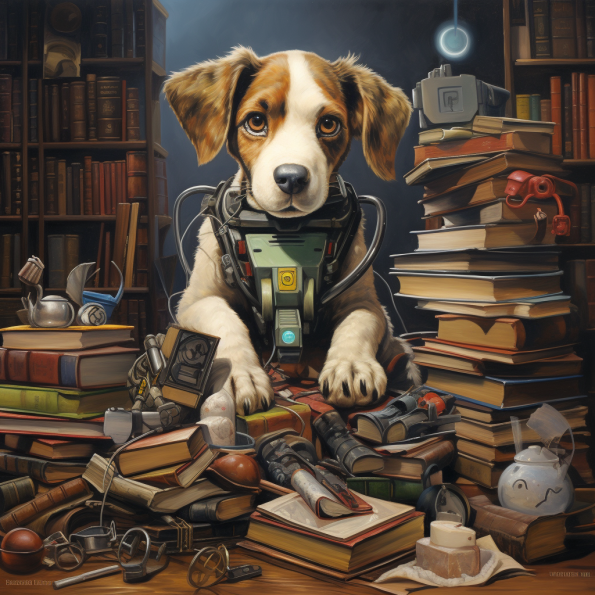
Midjourney responding to the prompt “robot painting a dog while surrounded by books”. Not sure what happened to the robot…
Then there’s the moral case, with artists and authors saying that generative models are stealing their art by using it for training purposes. And I’m going to be blunt here: my moral position is pretty much the opposite of that one.
Part of the reason is that my position on copyright is actually pretty far out of the norm, in a permissive direction. My attitude is that, in general, growing the commons is good and creating a monopoly is bad; so, as a corollary I’m pretty dubious about copyrights and patents in general. Ultimately I think that copyrights and patents are a good idea, but while I can see the moral case for them, my main reason for supporting them is a pragmatic one, and it’s basically the same one as stated in the United States Constitution:
To promote the Progress of Science and useful Arts, by securing for limited Times to Authors and Inventors the exclusive Right to their respective Writings and Discoveries
I think we get more art by giving artists a monopoly over their works in the form of copyright; but I also think that monopoly should be limited (and in particular I’m strongly against the repeated extension of copyright terms that we’ve had over the last century), and I’m also strongly on the side of allowing derivative works.
But, even if we set aside my unusual positions on this matter, I still think the obvious position to start from is to say that we should allow computers that are producing new works to be able to use old works to the same extent that we would allow humans who are producing new works to be able to use old works. And, in that light, the analogue of the statement “we shouldn’t let generative models train on works created by human creators without those creators permission” translates into “we shouldn’t let humans be inspired from works created by other human creators without those other creators’ permission”. Personally, I think that last statement is ridiculous, and if treated seriously would be a huge threat to art.
So yeah, plagiarism isn’t great. Plagiarism isn’t great when done by humans; and if somebody uses generative models to end up with work that we would call plagiarized if it were generated by a human, then fine, call the computer generated work plagiarized as well, and penalize it similarly. But the vast, vast majority of work coming out of these generative models doesn’t fall into that bucket.
And, in particular, producing work in the style of an artist isn’t plagiarism. It’s not plagiarism when done by a human (and it’s also not uncommon when done by a human!); it’s not plagiarism when done by a computer.
I haven’t used the term “AI” anywhere in this post, and that’s intentional. It’s a term that can be used in too many different ways and with too many overtones; when thinking about stuff like this, I find that it just gets in my way. I have no idea to what extent generative models are an important stepping stone towards an artificial general intelligence; and I’m willing to believe that AGIs do raise potential problems that are worth taking seriously. (Though, honestly, I’m not convinced by AGI doomerism, either; I just don’t feel that I have anything approaching an informed opinion about it.)
But, when it comes to generative models, my attitude is much more straightforward. In general, automation is good for society as a whole, because it produces more stuff and because it lets us level up the kinds of tasks that we take on as a society. Frequently, automation doesn’t even have a negative effect on people whose jobs are being automated. (There are more bank tellers now than before automated teller machines were invented!)
And part of putting works of art out into the commons is that other people will be affected by those works of art, which might mean that they’ll want to have more art that is similar to your art; that’s a good thing rather than a bad thing.
Post Revisions:
This post has not been revised since publication.
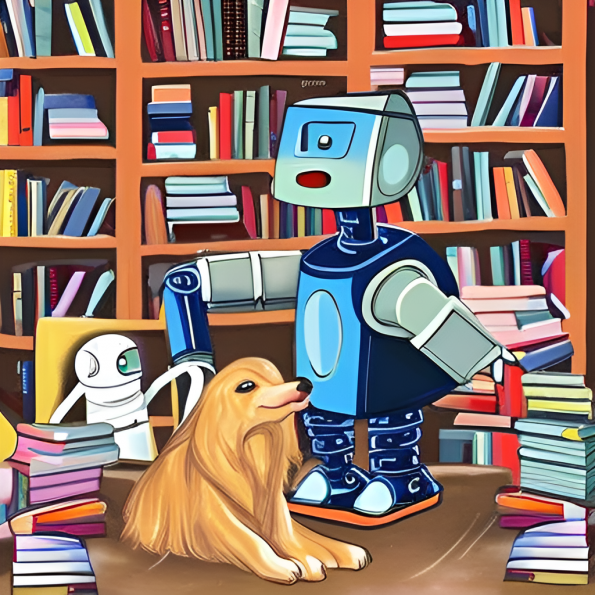
 Posts
Posts